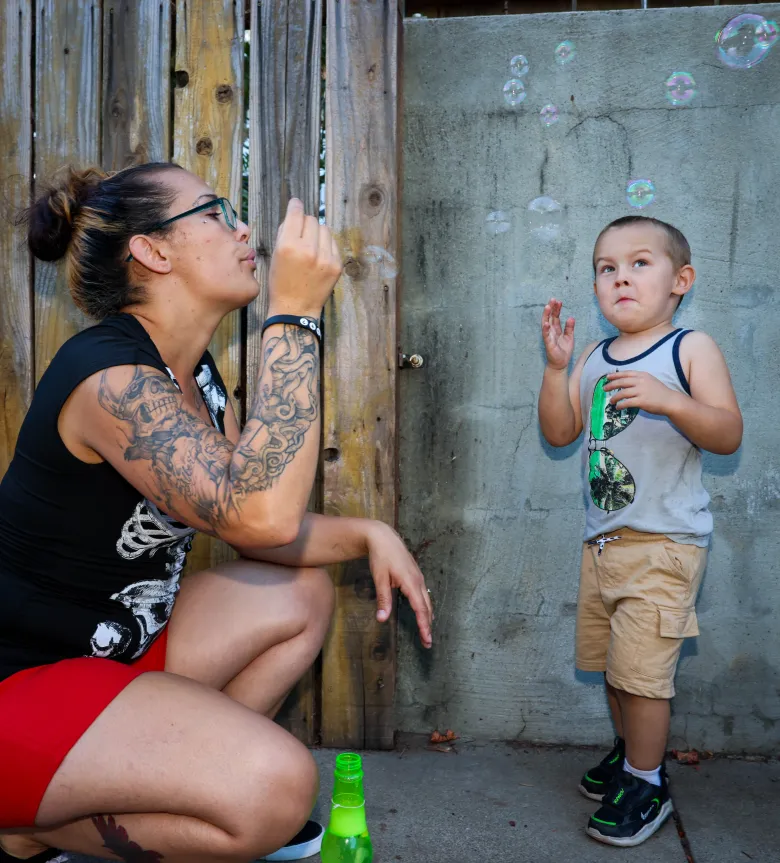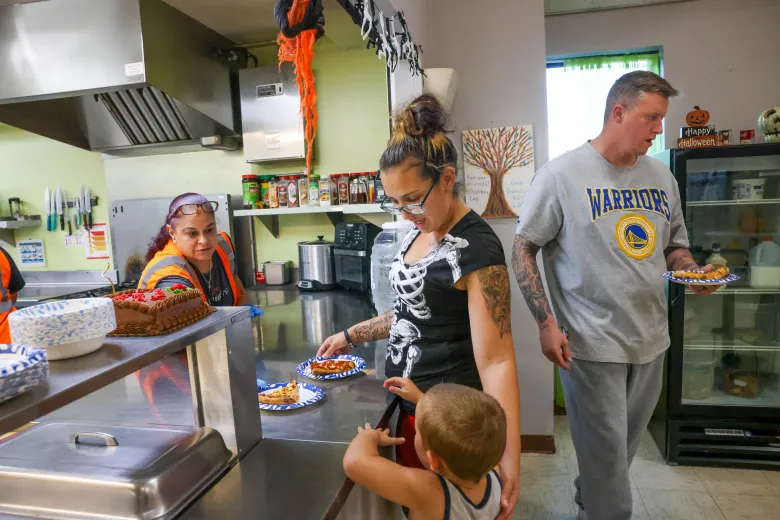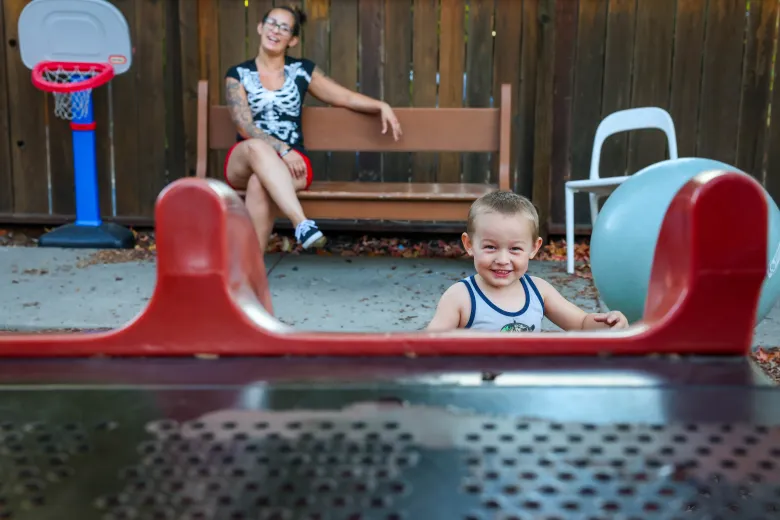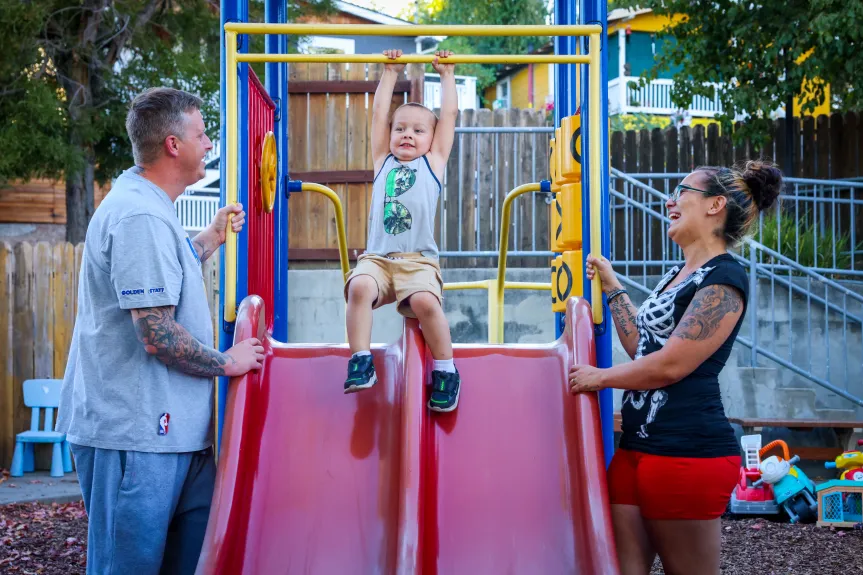They drew the line at getting high in the same room as their three-year-old son.
Never went that far, no. Anastasia and James Burke ensured that Liam was away from the needles, the fentanyl, their friends — if they could use that term, “friends,” for the people they’d crash with when they were using, all holed away in the same “trap house.”
They knew to keep Liam away from the drugs, and when they were on drugs, they knew to keep away from Liam. They knew they risked his life having him there. Just a few months earlier, a friend had gotten high on fentanyl — fentanyl that ended up in his sweat. Sweat that soaked from his chest to the cheek of his baby who fell asleep there. Hours later, the friend woke up. The baby didn’t.
“That little girl, that beautiful life,” James, 34, would think. “One wrong decision.”
James and Anastasia’s friend, in jail now for it, so easily could have been them. It wasn’t just one wrong decision, of course — but the same decision, repeated in a cycle neither they nor their friend could break.

Until this summer, when the couple decided to quit.
“I could see in James that he was so tired and done,” said Anastasia, 30. “It was only a matter of time before he was done using, or he wouldn’t be with us anymore.”
In June, Anastasia had James drop her and Liam — who has a different biological father — off at a rehab clinic. Six days later, James checked himself into a treatment center, too.
When their programs ended in August, they weren’t sure where to go. Both had attempted sobriety before and know how precarious it can be. After Anastasia left her first treatment program in 2021, just before Liam was born, she ended up in a group house where she shared a single room with four women, then to a shelter in Richmond that got shut down shortly after she arrived, then to a family friend’s house, then to her mother’s place. That’s when her most recent relapse began.
“In the past, when I would try to get clean, it was just me,” Anastasia said. “It was hard, because everything I knew was in the drug world.”
James, 34, was no different. He’s battled addiction since he was 13, and been incarcerated for much of his life, just like his father before him. He’s considered himself homeless at several different points in his life.

Anastasia’s recovery counselors put her and James in touch with Shelter Inc, a nonprofit that runs several homeless shelters around the Bay Area. Shelter Inc. offered the Burkes a private room at the 32-bed Martinez family shelter, where they could stay with Liam and chart out a path forward. Through the East Bay Times’ annual Share the Spirit campaign, which seeks to raise money for the most vulnerable in our communities, Shelter Inc. is hoping to raise $25,000 to help couples like the Burkes get a fresh start on life.
The Burkes moved into the shelter in August. The days are full — the Burkes and other families meet each morning in the common area for breakfast, then tick off their assigned chores. Either James or Anastasia drop Liam off at daycare. During the day, they might head out to a support group (they both attend several). In the evening, they pick up Liam, who’s rarely ever tired out, and let him loose on the shelter’s playground alongside some of the other children staying there, while Anastasia works on her homework from the classes she recently began at Diablo Valley College. There are often activities — for both the kids and the parents. The day ends back in the kitchen, where families grab dinner together.
On a recent Wednesday evening, Anastasia and James helped Liam to a slice of pepperoni pizza before serving themselves. Liam was repeating a joke that he’d heard: “Mommy, guess what?” he asked.
“What?”
“You got a chicken butt!”
She laughed, not so much at the joke but from how much pleasure Liam seemed to get out of it, his eyebrows pointed and raised high.
“It’s been great here, with all the meals, the other people,” Anastasia said. “It’s a lot of different cultures here, but the one thing we have in common is that we’re all families trying to get back on track.”
Instrumental to their recovery journey, the Burkes said, have been the shelter’s staff.
“Everyone here has just really been on board trying to help us get better,” James said.
Kathryn Ross, the shelter’s manager, has a special fondness for the families housed at the Martinez shelter — she herself has experienced periods of homelessness before. In fact, many of Shelter Inc.’s staff have, making their work all that more personal.

“Being able to share with the participants that there is hope out there, that they’re not alone — that’s so rewarding,” Kathryn said. “You get to see so much change in people, how they start believing in themselves, and their whole demeanor changes.”
One of the most difficult tasks the shelter has is convincing people to stay on, and keep working toward a better life for themselves, however that may look, said Shayne Kaleo, program director for Shelter Inc.
“To do this work, you have to have a stamina and resolve such that you’re able to look trauma in the face and help folks through that journey,” Kaleo said. “And it’s not an easy path.”
So far, both James and Anastasia have managed to stay the course. This October, both James and Anastasia marked 100 days of sobriety, an accomplishment they say wouldn’t have been possible without the stability offered by Shelter Inc.
Anastasia recently began working toward a degree in addiction studies, which she hopes will allow her to become a recovery counselor. For his part, James remains focused on recovery, but he’s slowly putting together a resumé and applying for jobs.
“I’m just grateful for places like this, because when we were out there, we couldn’t do it,” James said. “We didn’t have nowhere to go, we didn’t have no money, no feet to stand on. And it’s hard when it’s like that, especially when you got a little kid that you’re trying to feed with no money… but I’m just really grateful I’m not in that dark place anymore.”
